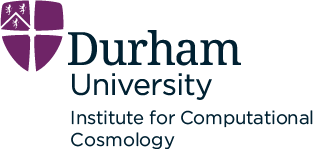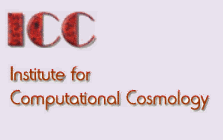The Institute for Computational Cosmology (ICC) is a leading international
centre for research into the origin and evolution of the Universe at Durham University .
We address some of the most fundamental questions in science:
What were the first objects in the Universe? How do galaxies form?
What is the nature of the dark matter and dark energy? Where does the
large-scale structure of the universe come from? What is the fate of
the Universe?
|
The ICC is part of the Ogden Centre for Fundamental Physics and interacts closely with the Centre for Extragalactic Astronomy and the Centre for Advanced Instrumentation in the Department of Physics. We offer both PhD and Msc postgraduate studentships.
| In November 2016, the ICC moved into the brand new Ogden Centre for Fundamental Physics building, designed by the world renowned Studio Daniel Libeskind. The new building now houses all three astronomy groups in the Department of Physics, including the Centre for Advanced Instrumentation and the Centre for Extragalactic Astronomy, as well as the Institute for Computational Cosmology. | 
|
Newsletter: The ICC's May 2015 newsletter is available for download.
|
RESEARCH 
|
STAFF 
|
COLLABORATIONS 
|
|---|---|---|
|
PUBLICATIONS 
|
POSTGRADUATE 
|
OUTREACH 
|
|
EVENTS 
|
NEWS ARCHIVE  |
COMPUTING FACILITIES
 |
|---|
|
RECENT PUBLICATIONS
<-- DO NOT ALTER THIS PHP CODE-->
2024 Monthly Notices of the Royal Astronomical Society, 530, 1394 (on-line)Manzoni G, Baugh C, Norberg P, Cabayol L, van den Busch J, Wittje A, Navarro-Girones D, Eriksen M, Fosalba P, Carretero J, Castander F, Casas R, De Vicente J, Fernandez E, Garcia-Bellido J, Gaztanaga E, Helly J, Hoekstra H, Hildebrandt H, Gonzalez E, Koonkor S, Miquel R, Padilla C, Renard P, Sanchez E, Sevilla-Noarbe I, Siudek M, Soo J, Tallada-Crespi P, Tortorelli L The PAU Survey: a new constraint on galaxy formation models using the observed colour redshift relation 2024 Monthly Notices of the Royal Astronomical Society, 530, 1369 (on-line) Jara-Ferreira F, Tissera P, Sillero E, Rosas-Guevara Y, Pedrosa S, De Rossi M, Theuns T, Bignone L The metallicity gradients of star-forming regions store information of the assembly history of galaxies 2024 Monthly Notices of the Royal Astronomical Society, 529, 1995 (on-line) Petley J, Morabito L, Rankine A, Richards G, Thomas N, Alexander D, Fawcett V, Calistro Rivera G, Prandoni I, Best P, Kolwa S How does the radio enhancement of broad absorption line quasars relate to colour and accretion rate? 2024 Monthly Notices of the Royal Astronomical Society, 529, 802 (on-line) Harvey D, Massey R Weak gravitational lensing measurements of Abell 2744 using JWST and shear measurement algorithm pyRRG-JWST |
|---|
Contact Details
Institute for Computational Cosmology,Ogden Centre for Fundamental Physics - West,
Department of Physics,
Durham University,
South Road,
Durham DH1 3LE
Tel: 44 (0)191 3343635
Conferences/Workshops

Durham-Edinburgh
eXtragalactic Workshop,
Edinburgh, Jan 10-11th 2023.






